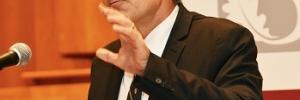
Change requires adjustment
Universities must reinvent themselves and adapt to the rapid changes in higher education to avoid stagnation, writes Prof Wim de Villiers, Rector and Vice-Chancellor of Stellenbosch University, in an opinion piece in Die Burger on Tuesday (2 February 2016).
- Read the complete article below or click here to read the article as published.
Forward, Maties!
Stellenbosch today is a far better university than when I completed my MB,ChB at its Medical School in 1983. The reasons are obvious: greater diversity, improved research, more internationalisation.
Back then, we were lily white; now 38% of our undergraduate and nearly 50% of our 10 000 postgraduate students are black, coloured or Indian. Then, our research output was rather low; now we appear high on international rankings. Then, we were problematic to the world; today we have 150 partner institutions in 44 countries across six continents, and 15% of our students are international – from 117 countries.
The successes that we have achieved can be directly traced back to us opening up, becoming part of the broader context – nationally and globally. Maties was once regarded as a "volksuniversiteit" (ethnic university for white Afrikaners only). Clearly, this notion was too narrow. It was an exclusionary inward focus on some instead of an inclusive outreach to all.
Today, we regard Stellenbosch University as a "national asset" serving the whole South African and global community. Times have changed. Stellenbosch cannot and will not be an island. We have embarked on a journey of transformation and shall continue along this path – to be locally relevant and globally competitive.
Higher education is undergoing rapid change, and all universities need to innovate and adapt to new circumstances, or else we will stagnate. Now is not the time for squabbling and navel gazing. As John F Kennedy said: "Change is the law of life. And those who look only to the past or the present are certain to miss the future."
We regard diversity as a prerequisite for excellence, as exposure to a larger variety of people and ideas broaden the mind and enhance our outputs. This was confirmed by Stellenbosch alumnus Dr Japie van Zyl of NASA's Jet Propulsion Laboratory, who received an honorary doctorate from Stellenbosch University in December. He shared his incredible experience working with a team of scientists and technicians who hail from 67 countries. As he put it: "Diversity is a major catalyst that brings out the best in everyone."
We have crossed the threshold of 30 000 students. Last year, for the first time ever, Stellenbosch had more English-speaking (44%) than Afrikaans-speaking (42%) students in total. This is set to continue if one looks at linguistic-demographic trends.
Our language policy receives a lot of attention. Some fear that our use of Afrikaans may exclude those who prefer to study in English; others fear that our use of English is putting Afrikaans at a disadvantage. I want to provide the assurance that Stellenbosch University remains committed to multilingualism without any exclusion.
Language should never be a barrier to any student. That is why we are expanding parallel-medium tuition (separate Afrikaans and English classes for the same module). By using English as medium of instruction, we ensure that we are accessible to more people. However, there still is a substantial need and demand for Afrikaans, which is why our Afrikaans offering is also continuing.
There is also an ongoing focus on student fees. The central idea emerging from the protests of 2015 is affordable higher education for all. We support this national call – and free, subsidised studies for academically deserving students who struggle financially – but for the moment, all universities are still reliant on student fees. We welcome the allocation of significant additional funds by the state as well as the appointment of a presidential commission of inquiry, and look forward to satisfactory outcomes.
Everyone has a right to lawful and peaceful protest under the Constitution. But there should not be any disruption, and everyone's rights should be respected. We condemn all acts of violence and intimidation. We have a responsibility to protect our institution and all its people, property and activities.
Universities are places of ideas, and the search for answers is always accompanied by contestation. But what we need to avoid at all costs is the danger of polarisation. As different sides demonise one another, it becomes difficult to find common ground. We need to reach out to one another in the search for communalities, rather than retreating into "us" and "them" camps.
We realise our journey is incomplete and imperfect, but we remain steadfast in our determination to go forward. Because that is the only way to create a community of "social justice and equal opportunities" for all – as our University mission states very clearly.
Yes, we do face some challenges at the moment, but there are also many exciting opportunities. We need to fix what is wrong and celebrate what is right. The Stellenbosch University of today stand for inclusivity, innovation and being future focused.
* Prof Wim de Villiers is Rector and Vice-Chancellor of Stellenbosch University (SU). This article is an edited version of his address to the SU Convocation on 26 January 2016.
